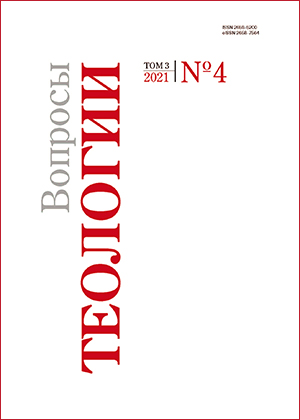Apologetic and educational tasks of Orthodox theology in regards to F. M. Dostoevsky’s spiritual insights (on the occasion of the 200th anniversary of the writer’s birth)
DOI:
https://doi.org/10.21638/spbu28.2021.404Abstract
The article attempts to define the most important tasks of modern Orthodox theology by analyzing the spiritual insights of the great Russian writer and philosopher F. M. Dostoevsky. The thinker wrote about the need to educate the Russian people in a Christian spirit in order for them to fulfill their worldwide mission. Russian university theology today is being formed in the conditions of worldview, ideological and religious pluralism. Differentiation of theological science and education on the basis of confessions is optimal in the current situation according to the author of the article. For Orthodox theology, the theoretical and methodological foundation should be, first of all, Holy Scripture and Holy Tradition, the richest experience of Eastern Christianity transmitted to Ancient Rus by Byzantium, patristic works and the works of a great many brilliant Orthodox theologians. Also, the spiritual and intellectual achievements of Russian religious philosophers, who, not without mistakes, strove to transfer the richest heritage of Orthodox thought into the secular language should be included. The analysis of Dostoevsky’s literary works, diaries, and notebooks, one of the most distinctive representatives of Russian metaphysics, determined the conclusion of the author of the article that for modern Orthodox theology, the most important tasks are apologetic and enlightenment. They are aimed at protecting the Christian faith from the multitude of myths that developed during the period of apostasy. In addition, these tasks are meant to cultivate knowledge about Orthodoxy and other traditional religions for Russia, both among young people and the older generations.
Keywords:
Ф. М. Достоевский, народ-богоносец, православная теология, апологетика, религиозное просвещение, русская метафизика, мировоззренческий плюрализм
Downloads
References
References
Downloads
Published
Issue
Section
License
Articles of "Issues of Theology" are open access distributed under the terms of the License Agreement with Saint Petersburg State University, which permits to the authors unrestricted distribution and self-archiving free of charge.




